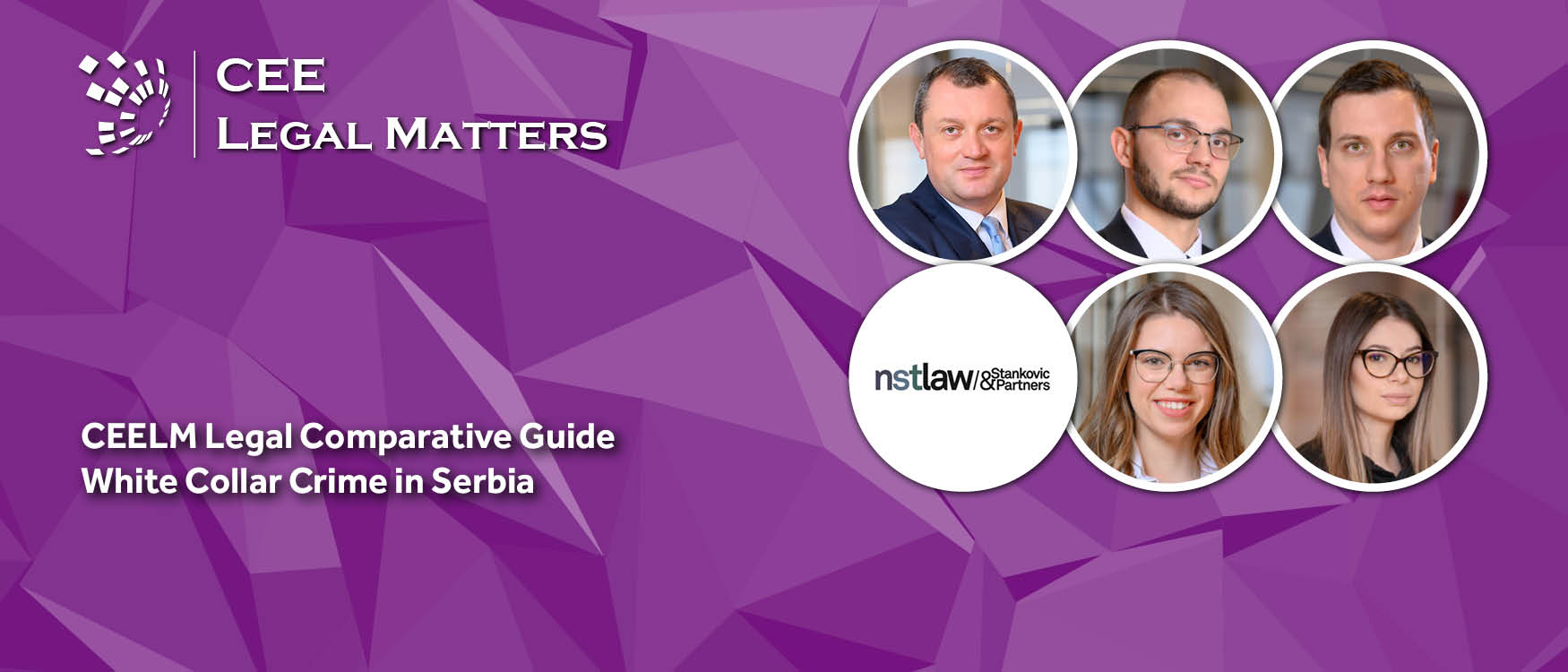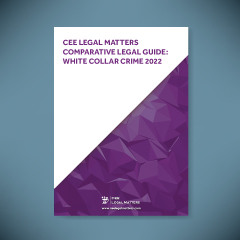Contributed by NSTLAW / Stankovic & Partners.
1. Legal Framework
1.1. What is the legal framework for bribery and corruption in your jurisdiction?
As a civil law country, Serbia’s legal framework for bribery and anti-corruption consists of ratified international conventions, as well as domestic regulations. The norms that regulate these matters are predominantly prescribed by laws and codes but are also spread across other general legal acts, such as by-laws of the Government and governmental bodies as sources of law. Serbia’s anti-corruption legislation is extensive, as the rules regulating bribery and corruption are disbursed into a number of acts constituting sources of law. To list the main sources of law, Inter alia, these are the UN Convention against Corruption, Criminal Law Convention on Corruption (and the additional protocol), the Civil Law Convention on Corruption, the Constitution of Serbia, the Law on Prevention of Corruption, the Law on Financing of Political Activities, the Law on Lobbying, the Criminal Code, Law on Liability of Legal Entities for Criminal Offenses, the Criminal Procedure Code, the Law on Organization and Jurisdiction of State Bodies in the Prevention of Organized Crime, Terrorism and Corruption, the Law on Prevention of Money-Laundering and Terrorism Financing, the Law on Protection of Whistle-blowers, the Law on General Administrative Procedure, the Law on Misdemeanours, the Law on Determination of Origin of Asset and Special Tax, and others.
1.2. Which international anti-corruption conventions apply?
Serbia is a member of the Council of Europe and is in negotiations for the accession to the European Union (EU), as one of the five current EU candidate countries. As such, it is a party to the main sources of international law, which have been ratified to represent a part of national legislation. However, it is still not a member of the European Union, thus the legislation of the European Union does not apply. According to the Constitution of the Republic of Serbia, ratified international treaties (just as generally accepted rules of international laws) constitute an integral part of the law of the Republic of Serbia and are directly applicable (with the condition that the confirmed international treaties must be in accordance with the constitution). International anti-corruption conventions that apply in Serbia (as ratified international treaties) are the UN Convention against Corruption, the Criminal Law Convention on Corruption (and the additional protocol), the Civil Law Convention on Corruption, the Agreement on the Establishment of the International Anti-corruption Academy as an International Organization, and the Memorandum of Understanding Concerning Cooperation in Fighting Corruption Through the South Eastern European Anti-Corruption Initiative.
1.3. What is the definition of bribery?
There is no direct and universal definition of bribery in Serbian law. The legislature provides for an indirectly derived definition of a “bribe,” through the elements of the two primary anti-bribery and anti-corruption crimes prescribed by the Criminal Code, entitled “Taking of Bribe” and “Receiving a Bribe.” Based on the contents of the legal norm that prescribes these crimes, a bribe is a gift, other benefits, or promise of gift or other benefits for oneself or another which is directly or indirectly requested or received by an official to perform, within its official authorities or in connection with its official authorities an official action which it should not have performed or to not perform an action which it had to perform.
The Law on Prevention of Corruption offers a more explicit definition of the term “corruption.” In this piece of legislation, corruption is a relationship that is established by the use of an official or social position or influence for the purposes of acquiring unallowed benefit for oneself or another.
It is important to note that there are some sources of law that provide different definitions of corruption. For example, the Law on Health Protection defines corruption as a relationship that is established by the abuse of performance of healthcare activity, that is, affairs of healthcare, for the purpose of acquiring personal gain or gain for another.
1.4. Is private sector bribery covered by law? If yes, what is the relevant legislation?
Considering that all of the anti-bribery and anti-corruption sources of law regulating these matters (see Section 1.1.) pertain predominantly to the relations between the private and the public sector, the private sector bribery is covered by law in the Serbian legal system. Serbian laws contain a wide arrange of established conflict of interest prevention and sanction norms for both private and public stakeholders.
1.5. What is the definition of a public official and a foreign public official? Are employees at state-owned or state-controlled enterprises treated differently? Are there official lists of public officials, offices, or state-owned or state-controlled enterprises?
It is important to note that the different laws contain different definitions of the persons they apply to, depending on both their application rationae personae and the used term for the purposes of that law. Also, the scope of the specific terms for a public officer (in the broadest sense of that term) are used throughout the legal framework differs (the terms are qualitatively and/or quantitatively broader or narrower).
The Law on Prevention of Corruption offers one of the broader definitions of a public official (or functionary) (in Serbian: javni funkcioner), where that is “a public official is any elected, placed, or named person in the public authority body, except for persons which are representatives of private capital in management bodies of a company which is a public authority body.” After some time passed since this law was introduced, the National Assembly of Serbia provided a binding authentic interpretation of this specific definition-containing provision. Thus, this provision was to be understood so that it applied to all persons which were directly elected by the citizens and persons which are elected, placed, or named by the National Assembly, President of the Republic, the Supreme Cassation Court, the High Judiciary Council, State Council of Prosecutors, Government of the Republic of Serbia, assembly of the autonomous province, the government of an autonomous province and bodies of local self-governmental units. In turn, a public authority body (in Serbian: organ javne vlasti) in the sense of the same law, is a body of the Republic of Serbia, autonomous province, local self-governmental unit and city municipality, institutions, public enterprises, and other legal entities founded by or whose member is the Republic of Serbia, autonomous province, local self-governmental unit and city municipality.
The definition of a foreign official person (in Serbian: strano sluzbeno lice) is determined by our Criminal Code. A foreign official person is any person who is a member, an official, or a public servant of a legislative or an executive body of a foreign state, a person who is a judge, juror, member, official, or a public servant of a foreign state court or an international court, a person who is a member, official, or a public servant of an international organization and its bodies, as well as a person who is an arbitrator in a foreign or international arbitration.
Employees at state-owned or state-controlled enterprises are not treated differently, but the definition of the subject of norms (as stated above) varies because persons which are representatives of private capital in management bodies of a company that is a public authority body are explicitly excluded from the definition.
1.6. Are there any regulations on political donations?
Yes, political donations are regulated in detail by a special piece of legislation – the Law on Financing of Political Activities, which regulates the sources of financing of political subjects.
According to the mentioned law, a contribution (in Serbian: prilog) is a monetary amount, besides membership fees, which a natural or a legal person voluntarily gives to a political subject, a gift, as well as services provided without compensation or under conditions which differ from market conditions.
1.7. Are there any defenses available?
There are no explicit and institutionalized defenses in particular proceedings. It goes along the standard line of having to lead parallel litigation and criminal proceedings if corruption is or was present. However, the laws provide legal remedies in criminal, civil, and administrative proceedings, and if corruption is doubted or proven, one of the options is the request for a retrial.
1.8. Is there an exemption for facilitation payments?
If considered stricto sensu, facilitation payments are not allowed. However, if taking into consideration protocolary (in Serbian: protokolarni) and conveniency (in Serbian: prigodan) gifts, these are explicitly allowed.
According to the Law on Prevention of Corruption, a protocolary gift is a gift that any public official (or functionary) or a member of family has received from the representative of a foreign state, international organization, or a foreign natural or legal person during an official visit or other similar occasions. On the other hand, a conveniency gift is a gift that is received on the occasions when it is traditional to exchange gifts, which become public property. However, exceptionally, the public official (functionary) can keep the gifts, if the value of these gifts does not exceed 10% of monthly earnings without taxes and contributions in the Republic of Serbia, so as that the gross value of all gifts that are kept does not exceed the amount of one average monthly earning during a calendar year.
1.9. What are the criminal sanctions for bribery? Are there any civil and administrative sanctions related to bribery cases?
The solutions for criminal sanctions in cases of bribery are provided in the Criminal Code. As mentioned, giving and taking bribes are considered to be two individual and separate criminal offenses. The basic forms of both crimes are sanctioned by a prison sentence, but legally defined periods of time for the sanctions differ. The basic forms of giving and receiving a bribe are sanctioned by a minimum of two and a maximum of 12 years of imprisonment, that is, eight years imprisonment. As for the qualified form of the crime, a maximum sentence would be 15 years.
1.10. Does the national bribery and corruption law apply beyond national boundaries?
The national bribery and corruption laws do not, as a rule, apply beyond national boundaries.
However, the Criminal Code, as the primary law regulating substantive criminal law in the Republic of Serbia, defines the majority of crimes, including giving and taking bribes. It stipulates that, under certain circumstances, the criminal legislation of the Republic of Serbia applies to the citizens of Serbia outside of the territory of Serbia that commit a crime, as well as to foreigners that commit a crime against Serbia or its citizens outside of the territory of Serbia, both under the condition that this person is either found or extradited to Serbia.
Also, according to the Criminal Code, the criminal legislature of Serbia applies to foreigners who commit a crime outside of the territory of Serbia. This will apply if the crime is performed against a foreign country or against a foreigner under the laws of the country in which the crime is committed. An additional condition is that the prescribed sanction for the committed crime is imprisonment for the duration of five years or if a more grievous sanction than that can be adjudged, under the additional condition that the plaintiff is found on the territory of Serbia and not extradited to the foreign country. As for the sentence, unless otherwise prescribed, the Serbian court deciding in this matter shall not adjudge a more grievous sanction than the sanction prescribed by the laws of the country in which the crime had been committed.
1.11. What are the limitation periods for bribery offenses?
The rules pertaining to the statute of limitations of bribery offenses do not differ from the regular legal regime for the statute of limitations prescribed for all other crimes and misdemeanors. However, the periods of time of the statute of limitations of bribery offenses differ and depend upon the prescribed sentence.
Serbian legislation recognizes two types of limitation periods: (a) limitations period for prosecution and limitation of execution of criminal sanctions; and (b) relative and absolute limitations period.
The statute of limitations for criminal prosecution implies that criminal proceedings can no longer be initiated after the expiration of the deadlines determined by law, i.e. that the proceedings cannot be continued (if already started) and it runs from the day the crime had been committed.
The statute of limitations for the execution of criminal sanctions implies that the imposed criminal sanctions cannot be executed, after the expiration of the legally prescribed deadlines, which runs from the day the judgments by which they were pronounced became final.
Both limitation periods are dependent upon the prescribed sentence (20 years – imprisonment over 15 years; 15 years – imprisonment over 10 years; 10 years – imprisonment over five years; five years – imprisonment over three years; three years – imprisonment over one year; two years – imprisonment under one year or monetary penalty). These constitute a relative limitation period.
The absolute limitation period expires in any case if double the amount of time of the relative limitation period expires.
1.12. Are there any planned amendments or developments to the national bribery and corruption law?
Serbia is in the process of harmonization of its legislation with the European Union. One of the primary goals of all the previous governments from 2010 until the present was the battle against corruption. The governments have proclaimed “zero tolerance” to all forms of corruption, especially systemic corruption. Serbia has previously enacted two main strategic documents: the National Strategy for Battle Against Corruption in the Republic of Serbia and the Action Plan for Implementation of the National Strategy for the Battle Against Corruption in the Republic of Serbia for the Period from 2013 until 2018, which was revised. The administrative body founded by the referenced law – the Agency for Prevention of Corruption, has enacted the strategic plan for 2019-023. The most recent strategic document that was enacted on July 22, 2020, as part of the harmonization process and opening of Chapter 23 of EU Accession Negotiations, relates to the development of the judiciary system for the period of 2020-2025. The Law on Prevention of Corruption was enacted in 2019 and has been amended three times, with an authentic interpretation of the legislator, so no new major amendments or developments are expected.
2. Gifts and Hospitality
2.1. How are gifts and hospitality treated?
Gifts that are protocolary and conveniency are allowed (see Section 1.8.).
2.2. Does the law give any specific guidance on gifts and hospitality in the public and private sectors?
Yes, according to the Law on Prevention of Corruption, a protocolary gift is a gift that any public official (or functionary) or a member of family is received from the representative of a foreign state, international organization, or a foreign natural or legal person during an official visit or other similar occasions, while a conveniency gift is a gift which is received in occasions in which it is traditional to exchange gifts, which become public property.
The exception, inter alia, is the Law on Health Protection, which prescribes that the expressing of gratitude in the form of a gift of lesser value, that is promotional material and samples, which is not expressed in monies or securities and whose individual value does not exceed 5%, and gross value does not exceed the amount of one average monthly salary without taxes and contributions in the Republic of Serbia, is not considered corruption, conflict of interest, private interest, in accordance with the law.
2.3. Are there limitations on the value of benefits (gifts and hospitality) and/or any other benefit) that may be given to a government/public official? If so, please describe those limitations and their bases?
Public officials are allowed to receive gifts if the value of these gifts does not exceed 10% of monthly earnings without taxes and contributions in the Republic of Serbia, so as that the gross value of all gifts that are kept does not exceed the amount of one average monthly earnings during a calendar year. The value of a gift represents the market price of the gift on the day when it is offered or received. The basis for these limitations is the norms in the Law on Prevention of Corruption. The gifts have to be protocolary and/or conveniency gifts.
However, some laws provide for different and specific limitations on the value of gifts.
2.4. Are there any defenses or exceptions to the limitations (e.g. reasonable promotional expenses)?
In case of a possible trial for either a misdemeanor or criminal offense, an accused person can use all available approaches, which include denying actual giving, denying it is a misdemeanor/criminal deed, error in fact, error in law, etc.
There are no exceptions to the limitations. The only exception is that a public official and members of his/her family are entitled to keep a protocolary or conveniency gift, where the value does not exceed 10% of the average monthly salary without taxes and contributions in the Republic of Serbia, but so that the total value of retained gifts in one calendar year does not exceed average monthly salary without taxes and contributions in the Republic of Serbia (see Sections 1.8. and 2.2.).
3. Anti-corruption compliance
3.1. Are companies required to have anti-corruption compliance procedures in place?
There is no such obligation for companies under Serbian legislation.
3.2. Is there any official guidance on anti-corruption compliance?
There is no official guidance on anti-corruption compliance. For Serbia’s legal framework on bribery and corruption please see Sections 1.1. and 1.2.
3.3. Does the law protect whistleblowers reporting bribery and corruption allegations?
Whistleblowers reporting bribery and corruption are protected by the Law on Protection of Whistleblowers. Protection is specifically provided in the cases of any other disclosure of information on violations of regulations, violations of human rights, the exercise of public authority contrary to the purpose for which it was entrusted, danger to life, public health, safety, environment, as well as to prevent large-scale damage.
4. Corporate criminal liability
4.1. Can corporate entities be held liable for bribery and corruption? If so, what is the nature and scope of such liability?
Pursuant to the Law on Liability of Legal Entities for Criminal Offenses, a legal entity may be liable for criminal offenses from a special part of the Criminal Code and other laws, if the conditions for liability of a legal entity provided by this law are met. A legal entity is liable for a criminal offense committed by the responsible person within the scope of its activities or authorizations in order to obtain a benefit for the legal entity.
Liability of a legal entity also exists if, due to the lack of supervision or control by the responsible person, it is possible to commit a crime in favor of the legal entity by a natural person acting under the supervision and control of the responsible person.
4.2. Can a company be liable for a bribery offense committed by an entity controlled or owned by it? Are there requirements for the parent to avoid liability in these situations?
The Law on Liability of Legal Entities for Criminal Offenses prescribes the limitations of liability of a legal entity, stating that the responsibility of a legal entity depends on the guild of the responsible person. The law defines the responsible person as a natural person who is legally or de facto entrusted with a certain range of activities in a legal entity, as well as a person who is authorized, or who can be considered authorized to act on behalf of the legal entity.
4.3. Can a company be liable for corrupt actions of a third-party agent engaged to help it obtain or retain business or a business advantage (such as government or regulatory actions or approvals)? If so, are there measures recognized in law, enforcement, or regulatory guidance to mitigate this liability?
Yes. Depending on the role of the company, that is, the role of the responsible person of the company, it could be the co-perpetrator, the instigator, or the accessory to the crime. The general regime applies.
4.4. What are the sanctions for the corporate criminal entity?
According to the Law on Liability of Legal Entities for Criminal Offenses, there are three types of sanctions: punishment, suspended sentence, and security measures. Penalties that may be imposed on a legal entity include a fine and the termination of the legal entity. The following security measures may be imposed for criminal offenses for which legal entities are responsible: prohibition to perform certain registered activities or jobs; confiscation of items; public announcement of the judgment.
5. Criminal proceedings into bribery and corruption cases
5.1. What authorities can prosecute corruption crimes?
Based on the type, these offenses could be considered crimes or misdemeanors. Competent authorities vary based on these types. It is important to note that Serbia has a special department of the Higher Public Prosecutor’s Office, which specializes in the suppression of corruption. For the most serious and organized crimes, there is a special prosecutor for organized crime and a court dealing solely with these cases, and a special department of the Higher Court in Belgrade. This prosecutor and department of court have jurisdiction in a case when a defendant, i.e. the person to whom the bribe is given, is an official or responsible person performing a public function based on the appointment by the National Assembly, the President of the Republic, the Government, a general session of the Supreme Court of Cassation, the High Judicial Council, or the State Prosecutorial Council.
5.2. Is there a legal obligation to report bribery and corruption cases? If so, to whom does it apply and what are the sanctions for failing to meet such an obligation?
There is an obligation for public officials to inform the public authority in writing about any gift they have received in connection with the performance of a public function, within 10 days from the day the gift is received. Failure to act in accordance with this obligation represents a misdemeanor. In case a public official does not report the crime or a person who committed a crime of giving bribery during the elections, that will constitute a criminal offense.
5.3. Is there any civil or administrative enforcement against corruption crimes?
There are both civil and administrative bodies. The Anti-Corruption Council is an expert advisory body of the Government of Serbia, while there is also an administrative body Anti-Corruption Agency (APC). The APC has preventive, control, and oversight competencies, i.e. verification of assets of public officials, control of financing of political activities, resolving conflict of interest and incompatibility of public offices, monitoring of the implementation of the national anti-corruption strategic documents, corruption risk assessment in legislation, monitoring of adoption and implementation of the integrity plans, conducting ethics and integrity training, cooperation with all relevant international anti-corruption stakeholders, cooperation with national stakeholders, including civil society organizations, etc.
5.4. What powers do the authorities have generally to gather information when investigating corruption crimes?
Authorities have the right to gather information by standard evidence-gathering techniques, such as interviews with perpetrators and witnesses, on-site investigation, expertise, etc. The Criminal Procedure Code especially states that in the case of bribery (as well as for some other designated crimes that the legislator finds especially dangerous and important), the authorities have special powers to collect evidence, notably: secret surveillance of communication, secret recording, simulated acts, undercover investigations.
5.5. Is there any form of leniency law in your jurisdiction, allowing a party to a bribery or corruption crime to voluntarily confess to the crime in exchange for a release from liability or reduction of the penalty?
There is an option to come forward, i.e. leniency, but only prior to the discovery of bribery by an official. The perpetrator of the bribery, who reported the crime before he/she realized that it was discovered, may be released from punishment.
5.6. Can a person plea bargain in corruption cases? If so, how is such a process conducted?
A person can plea bargain in a corruption case. The plea bargain may be concluded by the public prosecutor and the defendants and it has to be approved by a judge. In the case of a plea bargain, a person must be represented by a lawyer. A plea bargain must-have elements specified in the Criminal Procedure Code, as well as optional elements. The pre-trial judge decides on the plea agreement at a hearing closed off to the public, and if the plea agreement is submitted to the court after the indictment is confirmed, the presiding judge. The pre-trial/presiding judge can dismiss, uphold, or reject the proposed plea bargain.








